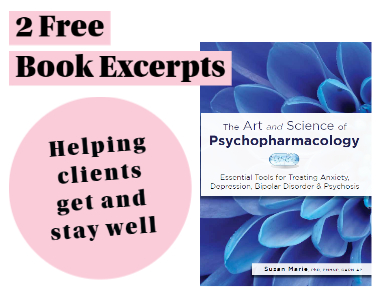Art & Science of Psychopharmacology
Helping clients get and stay well

Building a framework—how you matter
Many mental health professionals are taught not to provide information about medication or ask about client concerns. That is most unfortunate, because you are a critical player in this game. You are so important (and overlooked) that I wrote this book, The Art and Science of Psychopharmacology (2020), for you.
I wrote it because as America’s suicide rate and suffering from mental illnesses rises, access to psychiatric prescribing professionals goes down. This situation is worsening as I write this during the COVID-19 pandemic. Many clinics have multi-month waiting lists to see a psychiatric-prescribing professional.
In my own experience as a psychiatric nurse practitioner, I have found that clients lose hope and give up on medications with such delays. They give up trying to get medication, they run out of the medications they’ve been started on, or get frustrated with adverse effects and throw away their medication, all of which results in unnecessarily suffering, including job loss, relationship difficulties, hospitalization, and at times, death by suicide. I know you’ve seen this, too.
You, the mental health professional, are a valuable resource when it comes to identifying and advocating for clients for whom medication is essential and critical. You can help them understand medication--and make it more approachable and decrease the stigma.
That is why I put together this guidebook. It’s easy to use and you can refer to it whenever you need. But it’s not just information about pills—it is a whole framework of approaches and skills you can use as you talk with your clients about medication. And yes, you will deepen your knowledge of psychiatric medication and this resource will give you the most up-to-date information on best practices and what to avoid.
Hope you enjoy and learn! Let me know if you find these strategies to be helpful in your practice. Welcome to the team.
The following are two excerpts from my new book The Art and Science of Psychopharmacology: Essential Tools for Treating Anxiety, Depression, Bipolar Disorder & Psychosis which you can
A common mistake...
It’s easy to get discouraged when you know your client would benefit from medication, but they don’t believe they have a mental illness. Commonly, we think that means the client won’t take medication. As it turns out, that’s not true.
People often have an understanding or belief about “what is wrong” that is, on the surface, incompatible with taking medication. For example, your client with psychosis or major mood disorder will say their condition is just stress. Don’t let that deter you. Ask about how the “stress” shows up--how does it affect their sleep? Their mood? Their temper with people they love, or their boss? Does it create fear of everyday activities, such as going out for groceries?
Talk about and validate how indeed those are distressing, which provides a segue to offering the option of medication to assist them in feeling better. Most people will be interested in considering medication, even while believing they do not have a mental illness. It is common for people to hold a cognitive dissonance—thinking there is no illness while at the same time taking medication. Don’t think your clients have to believe they have a mental illness before they will take or stay on medication!
Metaphors to make medication more approachable
One way to help your client understand how medication may be helpful or works, or the dangers of their medication, is to use metaphors. Metaphors transform the confusing, frightening world of psychiatric medication into something familiar, something they can wrap their head around and remember.
One metaphor used to clarify the purposes of various medications for bipolar disorder, is a home. A good home needs a floor to keep you off the ground (that is, prevent depression), but also needs a roof (to prevent mania). Some medications do one, but not the other. Some medications do both. For example, Lamictal© (lamotrigine) is an excellent medication to prevent depressive episodes (a floor), but not much of a roof—perhaps a palm frond roof (providing limited prevention of mania).
Connecting this image to which medications do what helps your client (or family member) understand how to respond when they are struggling. For example, when feeling that uptick in energy of developing mania, increasing Lamictal© will not be helpful, but taking that extra prescribed Seroquel© (quetiapine), which is an excellent roof, DOES make good sense—and can keep you out of the hospital.
My clients find this empowering and, as one woman proudly said when she saw me weeks later, “I knew what to do, and it helped, and I’m fine!”
Many mental health professionals are taught not to provide information about medication or ask about client concerns. That is most unfortunate, because you are a critical player in this game. You are so important (and overlooked) that I wrote this book, The Art and Science of Psychopharmacology (2020), for you.
I wrote it because as America’s suicide rate and suffering from mental illnesses rises, access to psychiatric prescribing professionals goes down. This situation is worsening as I write this during the COVID-19 pandemic. Many clinics have multi-month waiting lists to see a psychiatric-prescribing professional.
In my own experience as a psychiatric nurse practitioner, I have found that clients lose hope and give up on medications with such delays. They give up trying to get medication, they run out of the medications they’ve been started on, or get frustrated with adverse effects and throw away their medication, all of which results in unnecessarily suffering, including job loss, relationship difficulties, hospitalization, and at times, death by suicide. I know you’ve seen this, too.
You, the mental health professional, are a valuable resource when it comes to identifying and advocating for clients for whom medication is essential and critical. You can help them understand medication--and make it more approachable and decrease the stigma.
That is why I put together this guidebook. It’s easy to use and you can refer to it whenever you need. But it’s not just information about pills—it is a whole framework of approaches and skills you can use as you talk with your clients about medication. And yes, you will deepen your knowledge of psychiatric medication and this resource will give you the most up-to-date information on best practices and what to avoid.
Hope you enjoy and learn! Let me know if you find these strategies to be helpful in your practice. Welcome to the team.
The following are two excerpts from my new book The Art and Science of Psychopharmacology: Essential Tools for Treating Anxiety, Depression, Bipolar Disorder & Psychosis which you can
A common mistake...
It’s easy to get discouraged when you know your client would benefit from medication, but they don’t believe they have a mental illness. Commonly, we think that means the client won’t take medication. As it turns out, that’s not true.
People often have an understanding or belief about “what is wrong” that is, on the surface, incompatible with taking medication. For example, your client with psychosis or major mood disorder will say their condition is just stress. Don’t let that deter you. Ask about how the “stress” shows up--how does it affect their sleep? Their mood? Their temper with people they love, or their boss? Does it create fear of everyday activities, such as going out for groceries?
Talk about and validate how indeed those are distressing, which provides a segue to offering the option of medication to assist them in feeling better. Most people will be interested in considering medication, even while believing they do not have a mental illness. It is common for people to hold a cognitive dissonance—thinking there is no illness while at the same time taking medication. Don’t think your clients have to believe they have a mental illness before they will take or stay on medication!
Metaphors to make medication more approachable
One way to help your client understand how medication may be helpful or works, or the dangers of their medication, is to use metaphors. Metaphors transform the confusing, frightening world of psychiatric medication into something familiar, something they can wrap their head around and remember.
One metaphor used to clarify the purposes of various medications for bipolar disorder, is a home. A good home needs a floor to keep you off the ground (that is, prevent depression), but also needs a roof (to prevent mania). Some medications do one, but not the other. Some medications do both. For example, Lamictal© (lamotrigine) is an excellent medication to prevent depressive episodes (a floor), but not much of a roof—perhaps a palm frond roof (providing limited prevention of mania).
Connecting this image to which medications do what helps your client (or family member) understand how to respond when they are struggling. For example, when feeling that uptick in energy of developing mania, increasing Lamictal© will not be helpful, but taking that extra prescribed Seroquel© (quetiapine), which is an excellent roof, DOES make good sense—and can keep you out of the hospital.
My clients find this empowering and, as one woman proudly said when she saw me weeks later, “I knew what to do, and it helped, and I’m fine!”
Be a vital, powerful resource in helping your clients benefit from medications.

The Art and Science of Psychopharmacology is filled with practical and adaptable strategies, client-friendly language, and the most up-to-date information about the medications being used to manage:
This book guides you through the various medications for each of these diagnoses and how to form essential conversations around your client’s prescription. Susan Marie’s decades of practice as a psychiatric nurse practitioner and educator shine through with lively case examples, discussion of complementary and alternative methods, and clear considerations for special and vulnerable populations.
Be an expert for your clients about the benefits of psychiatric medication and minimize any potential harm - this is the resource you will return to over and over again.
- Depression
- Anxiety
- Bipolar Disorder
- Psychosis
- Insomnia
This book guides you through the various medications for each of these diagnoses and how to form essential conversations around your client’s prescription. Susan Marie’s decades of practice as a psychiatric nurse practitioner and educator shine through with lively case examples, discussion of complementary and alternative methods, and clear considerations for special and vulnerable populations.
Be an expert for your clients about the benefits of psychiatric medication and minimize any potential harm - this is the resource you will return to over and over again.
Meet the Expert:
Susan Marie, Ph.D., CARN-AP, a licensed psychiatric nurse practitioner with full independent prescriptive practice and certification in addictions, brings to you over 30 years of clinical experience with highly vulnerable clients with suicidality, co-occurring addiction, homelessness, serious mental illnesses, traumatic brain injuries, and persistent pain conditions. She is noted for her “pearls and pitfalls” of psychopharmacology. Her passions are radical respect for people with serious mental illnesses & addictions, excellence in psychopharmacology, and integrating psychotherapeutic interventions for clients with PTSD, addictions and chronic pain.
Dr. Marie is Senior Clinical Director for Behavioral Health at Old Town Clinic, Central City Concern and Associate Professor at Oregon Health and Science University in Portland, Oregon. She teaches nationally on psychopharmacology as well as suicide assessment and intervention.
Learn more about the expert's educational products, including upcoming live seminars, by clicking here.
Dr. Marie is Senior Clinical Director for Behavioral Health at Old Town Clinic, Central City Concern and Associate Professor at Oregon Health and Science University in Portland, Oregon. She teaches nationally on psychopharmacology as well as suicide assessment and intervention.
Learn more about the expert's educational products, including upcoming live seminars, by clicking here.



